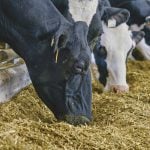Preliminary results from a swine feeding trial with rations high in distillers’ dried grains with solubles (DDGS) suggest an opportunity for Canada’s pork producers to load up on cheap feed.
Eduardo Beltranena, a pork research scientist with Alberta Agriculture and Rural Development’s competitive livestock production wing in Edmonton, was quoted Sunday in a release from the U.S. Grains Council explaining DDGS’ potential as a feed ingredient for hog farmers in Canada and worldwide.
Beltranena, whose work was funded partly by the USGC, was addressing the council’s international marketing conference and annual meeting in Guatemala City.
Read Also

U.S. livestock: Cattle regain ground, hogs dip
Chicago cattle futures regained ground on Wednesday after falling off a cliff late last week. Most-active December live cattle contracts…
“At this stage in the study, DDGS is proving to be an economical, quality feed for pork producers to utilize in their rations,” he said in the release. “As the project continues, further effects on pork quality can be determined, therefore creating a broadened market for the abundant and valuable co-product of ethanol production.”
The study, he said, is now in the process of determining the impact on growth performance and pork quality with the inclusion of high levels of DDGS in the swine diet. So far, though, he reported “no concern whatsoever” in the growth performance of the pigs when fed DDGS.
The preliminary results, he said, point to a slightly higher yield of pork with a lower level of intramuscular fat compared to swine fed on a soybean meal-based diet. The lower intramuscular fat, he said, would be an attraction for consumers.
The research now also goes to determine the amount and duration of the dietary inclusion level of DDGS prior to market weight, so as to avoid undesirable effects on pork and fat quality.
These withdrawal rates will be “imperative” to the producer and processor in order to maintain the quality of product the consumer demands, USGC quoted Beltranena as saying.
Ethanol production capacity has risen substantially in the U.S. in recent years as companies have taken advantage of new government incentives and have created equally substantial stocks of distillers’ grains as a byproduct.
However, volatility in U.S. corn, a key feedstock for U.S. ethanol, has more recently pressured producers’ margins, as have low oil prices and the recent credit crunch.
The Reuters news service last week quoted an executive with grain processor and ethanol maker Archer Daniels Midland (ADM) as saying over 20 per cent of current U.S. ethanol plant capacity has now been idled.















